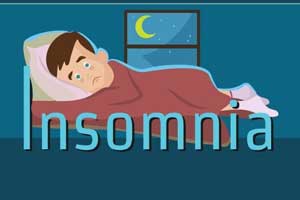- Home
- Editorial
- News
- Practice Guidelines
- Anesthesiology Guidelines
- Cancer Guidelines
- Cardiac Sciences Guidelines
- Critical Care Guidelines
- Dentistry Guidelines
- Dermatology Guidelines
- Diabetes and Endo Guidelines
- Diagnostics Guidelines
- ENT Guidelines
- Featured Practice Guidelines
- Gastroenterology Guidelines
- Geriatrics Guidelines
- Medicine Guidelines
- Nephrology Guidelines
- Neurosciences Guidelines
- Obs and Gynae Guidelines
- Ophthalmology Guidelines
- Orthopaedics Guidelines
- Paediatrics Guidelines
- Psychiatry Guidelines
- Pulmonology Guidelines
- Radiology Guidelines
- Surgery Guidelines
- Urology Guidelines
Insomnia may increase risk of coronary artery disease, heart failure and stroke: Circulation

Data from more than a million people found that genetic liability to insomnia may increase the risk of coronary artery disease, heart failure and stroke. Among types of ischemic stroke, genetic liability to insomnia was primarily associated with an increased risk of large artery stroke. The findings of the study have appeared in the American Heart Association’s journal Circulation.
Previous observational studies have found an association between insomnia, which affects up to 30% of the general population, and an increased risk of developing heart disease and stroke. These observational studies were unable to determine whether insomnia is a cause, or if it is just associated with them, explained Susanna Larsson, Ph.D., lead study author and associate professor of cardiovascular and nutritional epidemiology at Karolinska Institutet in Stockholm, Sweden.
In this first-of-its-kind study on insomnia, Larsson and a colleague applied Mendelian randomization, a technique that uses genetic variants known to be connected with a potential risk factor, such as insomnia, to reduce bias in the results. The 1.3 million participants with or without heart disease and stroke were drawn from four major public studies and groups.
Researchers found genetic variants for insomnia were associated with significantly higher odds of coronary artery disease, heart failure and ischemic stroke – particularly large artery stroke, but not atrial fibrillation.
“It’s important to identify the underlying reason for insomnia and treat it,” Larsson said. “Sleep is a behaviour that can be changed by new habits and stress management.”
A limitation of this study is that the results represent a genetic variant link to insomnia rather than insomnia itself. According to Larsson, it was not possible to determine whether or not individuals with cardiovascular disease had insomnia.
Larsson’s co-author is Hugh Markus, M.D., FMed.Sci. Author disclosures are on the manuscript.
The Swedish Research Council for Health, Working Life and Welfare (Forte), the Swedish Research Council, a British Heart Foundation program grant, and the National Institute for Health Research funded the study.

Disclaimer: This site is primarily intended for healthcare professionals. Any content/information on this website does not replace the advice of medical and/or health professionals and should not be construed as medical/diagnostic advice/endorsement or prescription. Use of this site is subject to our terms of use, privacy policy, advertisement policy. © 2020 Minerva Medical Treatment Pvt Ltd